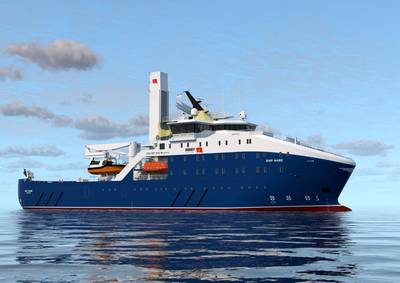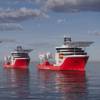Bibby Marine to Build Zero-emission eSOV
Bibby Marine and its consortium partners are moving forward with plans to build the world’s first zero-emission electric service operation vessel (eSOV) after securing funding for the project from the Zero Emission Vessel Infrastructure (ZEVI) competition.
The award, announced Monday at London International Shipping Week, comprises of match funding to build the pioneering vessel, which will operate solely on 20MWh of batteries – a significant step toward achieving the marine industry’s net-zero ambitions. The Bibby Marine led consortium includes the Port of Aberdeen, Offshore Renewable Energy (ORE) Catapult, Kongsberg, DNV, Shell and Liverpool John Moores University.
Bibby Marine CEO, Nigel Quinn, said, “We are excited to receive this funding and to work with our partners to launch the world’s first eSOV – the first new vessel for Bibby Marine in five years. This project is the natural progression of our decarbonization journey, which began in 2019, to find the right solution to achieve our net-zero goals.
“Designed in the U.K., the vessel will be a game changer for our industry – supporting its ambitions to turn the U.K. into the world’s number one center for green technology, create jobs and accelerate our path to net zero, by harnessing the best of British technologies. The vessel also offers the opportunity for customers to increase local content and will shine a light on U.K. innovation.”
According to Bibby Marine, the groundbreaking project has far-reaching implications for the industry. With nearly 40 gigawatts (GW) of new offshore wind capacity to be added in the U.K. alone by 2030, equating to between 62 and 149 vessels, the company said it sees a clear need to develop and implement innovative solutions. Bibby Marine said its learnings from this project will help inform and shape the learnings for the rest of the industry.
Quinn continued, “We strive to be the U.K.’s clean and most committed SOV operator, and our commitment to innovation and sustainability drives us towards these zero-emission solutions. This project is a crucial part of this vision and is in keeping with our own Compass values, Environmental and Social Governance framework and net zero targets. The project will catapult our efforts for our own green future, resulting in Bibby Marine having one of the most advanced, efficient, and environmentally friendly SOVs on the market.”
Andrew Macdonald, director of development and operations at ORE Catapult, said, “ORE Catapult will play an important role in understanding the lifecycle fuel savings of a zero-emission vessel, and what can be done to maximize U.K. content within this market.
“This project will strengthen and demonstrate the ability of U.K. industry as a partner in design, manufacture and certification of the 300 vessels of this kind needed in Europe by 2050.”
Lucas Ribeiro, regional manager, region West Europe at DNV, said, “The number of fully electric and hybrid vessels will surge over the next few years and continuing development on these technologies will be a key part of the maritime industry’s transition to a zero-carbon future. DNV is looking forward to combining our extensive technical, offshore, renewable and battery experience, working in ensuring a successful fully compliant and future proof vessel delivery.”
Alexandra Ebbinghaus, Shell's GM for marine decarbonization, said, “This is an exciting project that will push the industry forward and help decarbonize short-sea shipping, whilst continuing to prioritize safe and efficient operations. We look forward to supporting our long-term customer, Bibby Marine, as well as strengthening our collaboration with Kongsberg Maritime, DNV, the Port of Aberdeen and other consortium members.”












